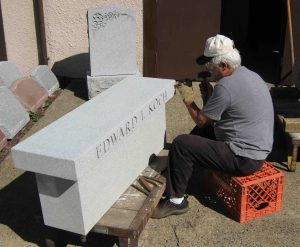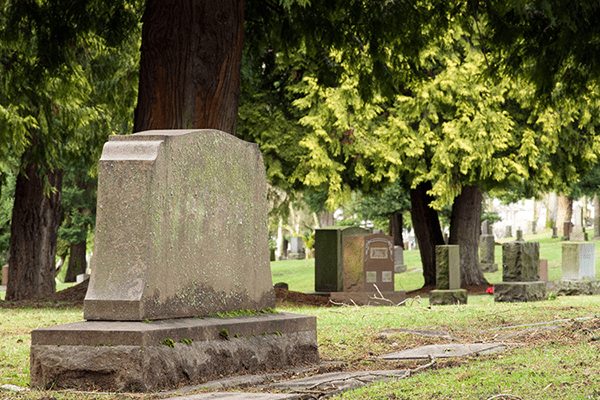|
RCBJ-Audible (Listen For Free)
|
 Hudson Valley Monuments Wants To Honor Those Who’ve Lost Their Lives
Hudson Valley Monuments Wants To Honor Those Who’ve Lost Their Lives
By Tina Traster
No business has been left untouched by the coronavirus crisis, including those in the “death care” industry, more familiarly known as cemeteries, funeral homes and monument makers.
Counterintuitively, at a time when COVID-19 has claimed more than 500 lives in Rockland, and 20,000 across New York State, Nyack-based Travis Monuments (Hudson Valley Monuments) has seen a 70 percent drop in business from mid-March to early June despite the spike in deaths.
Anthony Minozzi, president of Travis Monuments says the impact of the coronavirus has caused a series of anomalies in his business, which was founded in 1899 by his grandfather and great uncle, stone carvers who immigrated from Naples to America. The company has satellite locations in Airmont, Carmel in Putnam County and Washingtonville in Orange County.
The unexpected spike in sudden deaths from COVID-19 forced many families to cremate rather than bury loved ones. “Funeral homes were inundated,” he said. “They could not handle the numbers. It was difficult to get death certificates and for cemeteries to dig graves fast enough. Typically more than 50% of people are cremated but now the numbers surged.”
More cremations meant less demand for carved headstones.
Add to that the lockdown, which kept people at home and stalled the usual spring rush to get headstones erected at gravesites. Companies like Travis Monuments ramp up in early spring when the ground has thawed to meet demand for the manufacture and installation of grave stones.
“This is when families start thinking about memorializing unmarked graves for family members,” said Minozzi, explaining that typically after Thanksgiving it is too cold to set foundations.
Hovered down for COVID-19, the usual spring-time rush lasted for two weeks and then fell off the cliff. “For about two weeks, families were scrambling to get monuments done but that was short-lived,” said Minozzi. “People were on lockdown. They didn’t want to go out. They’re were worried about health and finances. They’re holding back on nondiscretionary spending.”
The Pandemic Pivot
Monument makers were not at first deemed essential businesses in New York so manufacturing screeched to a halt. The company was not able to service customers in its showroom. But Travis Monuments did the “pandemic pivot,” setting up their employees with software on home computers so they could continue to do drafting work. Minozzi’s has kept his seven employees but scaled back their hours. His operations manager Alan Genee worked part-time hours but has been available “anywhere, anytime for anything” throughout the crisis.”
The pandemic has taught us how that re-invention is the mother of necessity.
Travis Monuments, which has withstood more than a century of challenges, is rising to the occasion with technology. They have set up an online showroom in which counselors work with clients to design monuments virtually. Clients receive a 3-D rendering through a screen share.
Ultimately, businesses that adapt to the pandemic world may find themselves well positioned to meet new demands.
Paying A Tribute To Others While Sustaining His Workforce
Minozzi is most excited to talk about an offer he is extending through July 4th to any family that wants to order a memorial headstone or moment. The company will provide free memorial carving and engraving, while families are only pay for the granite and cemetery installation. Additionally, for monuments that memorialize a first responder, military veteran, or someone in the healthcare field, the installation charge will be donated; families will only pay for the granite. The cost of the space in the cemetery of their choosing is not included.
Minozzi credits the idea to his wife Angela, who lost a friend to COVID-19.
“My wife said ‘you have to come up with a way to memorialize people who’ve died,’ ” said Minozzi. “I knew this man who died. He had a beautiful family. He was 44 years old. Our kids played together.”
Even for a man who works in the death business, Minozzi said he was shocked to his core.
“Just to see a life disappear. To know those kids lost a huge part of their life. That’s when it hit home.”
The monument maker said offering these services is good for the world and for his employees too. “A lot of our work is done in the shop. We don’t outsource it. We’re not paying third-party custom fabricators. It will stimulate the sale of granite. This will help us keep our team in place. Keep food on the table.”
Like any business owner, Minozzi has known sleepless nights and anxiety while steering the ship though uncertain seas. He’s not sure if we will see a second wave of the virus and what they might bring. “It’s frightening to think how people will recede if we see a second wave,” said. “Maybe we’ll just rebuilt gradually.”
But Minozzi has good advice for other businesses.
“I’m not using a 12-month cycle for planning right now,” he said. “That’s too risky. Businesses should give themselves an 18-month cycle at least because no one really knows what’s going to happen.”
Interesting words from someone who deals with one of life’s only two certainties: death and taxes.












